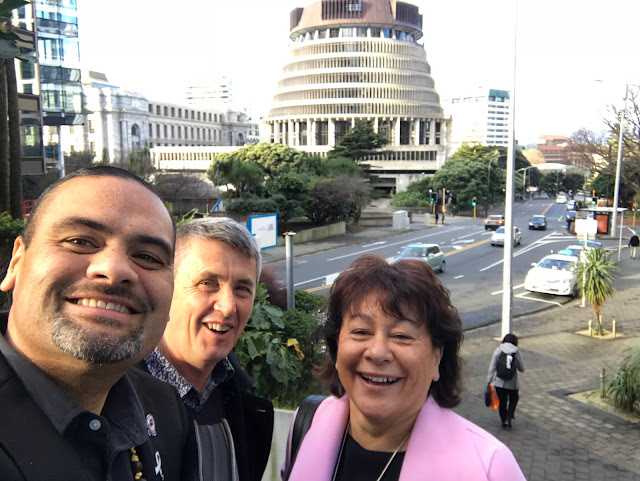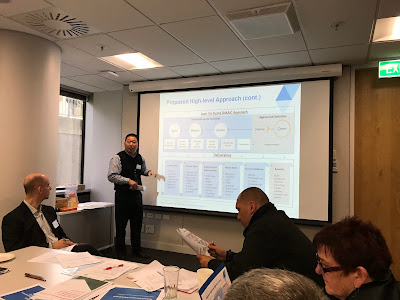On the 25 July I attended the
“Joint Taskforce on Reducing Compliance”
as the representative of NZPPA. We are a task force that comes under the
“Education Workforce Strategy Governance Group”
which Sepora Mauigoa is our NZPPA Rep on.
We are tasked with:
- The Joint Taskforce will look for those tasks that are unnecessary, overly complex, or duplicative with the aim of redesigning processes and reducing tasks, thereby reducing the burden of compliance and administration on principals and teachers within state and state- integrated schools and Kura.
- Assessment tasks are out of scope due to related reviews underway, such as the NCEA review.
- The Joint Taskforce will report back to the Minister of Education in September 2018. It will also work alongside the development of the Education Workforce Strategy 2032 (the Strategy).
Here are the Minutes of the meeting on the 25 July:
Here is the Terms of Reference for the Taskforce:
The big plan of the Taskforce is to start to gather voice in relation to compliance burden from as many voices as possible. The ministry has devised a consultation process which I will try and explain below:
School-Focused Workshops – Revised Approach
The Ministry have reflected on feedback provided by the Joint Taskforce on the proposed workshop approach to capture compliance burden themes, activities and details.
Below sets out a revised approach, this reflects expanding the size and scope of the workshops to better engage participants and to improve confidence on key observations and insights. Note that the revised approach adds considerably more time and increases the complexity of logistics – this will impact on what we will be able to report to the Minister in September (via the Education Workforce Strategy Governance Group or appointed sub-body).
Workshop Size, Number, Location and Venues
- Up to 12 participants per workshop
- Up to 10 workshops (maximum of 120 participants involved in total)
- Workshop locations will be based on the final list of schools identified and invited (this could mean one or more workshops in the regions of Auckland, north of Auckland, central North Island, Wellington and Christchurch)
- We have not yet identified venues, and welcome suggestions from Taskforce members (e.g. if there is potential to host at a school as was suggested).
Workshop Attendees
- We will seek a wide representation of school staff (who are knowledgeable on compliance activities), and we will think carefully about how we can best align workshop attendees based on their role / position within schools
- It is preferable to have at least one Joint Taskforce member at each workshop to introduce the workshop purpose, objectives and outcomes
- Workshops will be facilitated by Joe Zhou, contractor to the Ministry of Education, and supported by other Ministry staff.
Workshop Attendee Pre-work
- Attendees will be encouraged to pre-identify and bring a list of compliance burden activities with them to the workshop.
Workshop Length and Content
- Workshops will be limited to one per day
- Workshops will start at 9.00am and conclude by 4.00pm (up to 6 hours working time plus 1 hour for breaks)
- The draft agenda is as follows:
|
Item
|
Net Time
|
|
1. Welcome and Introduction
|
30 min
|
|
2. Brainstorm high-burden compliance activities
|
60 min
|
|
3. Define, describe and validate burdens in more detail
|
105 min
|
|
4. Evaluate, analyse and propose solutions
|
135 min
|
|
5. Summarise findings and next steps (including if follow-up is required)
|
20 min
|
|
6. Thank, seek feedback and close
|
10 min
|
|
Net Working Time
|
6 hours
|
|
Breaks (Morning, Lunch and Afternoon)
|
1 hour
|
School Lists
The draft list of schools is based on the original proposal to have two workshops of 10 schools in each of three regions. The list contains 24 schools for Auckland, 23 for Wellington and 23 for Christchurch.
There are currently no special schools on the list, and we are aware there are some gaps in the coverage of the lists, in particular:
- intermediate schools
- secondary schools (there are currently more primary schools on the list)
- composite schools.
The list was generated with input, advice and review from the Ministry’s regional staff. This process provided a mix of schools, nominated based on regional knowledge of which schools could provide quality input and what other initiatives are going on in the regions.
I have recommended names of our NZPPA members to be added to the lists of schools to be considered. Schools will be invited to put forward names of possible attendees and then the MOE will notify.
This is only the start of the process and by no means if you do not attend the meetings it doesn’t mean its over… we are also seriously considering putting together a survey out to principals and teachers to complete after the meetings.
One of the cool parts of being on this Taskforce is Helen Varney is there to keep me focussed and on track.


